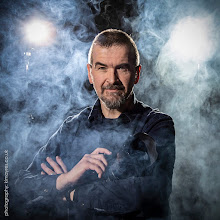The Proof is in The Pudding - and Episode 23 of Understanding Photography with Kim Ayres
What makes it a good photo?
Or a good piece of art?
Or a good meal?
As someone who now has a weekly podcast where the lion's share is dedicated to helping people improve their photography, this is something I come back to again and again.
Is what makes a good photo the fact that the photographer was skilled and knowledgeable about all the technical aspects of the camera?
Or that they enjoyed creating it?
Or that they put a lot of effort into creating it?
Or that this particular critic or knowledgeable person says it's good?
Or that the image contains at minimum of a 126 of the 437 rules of colour and composition as laid down in the Ancient Chronicles of Sinullia and carefully controlled by the Custodians of Gaethred?
Is it all of these things?
Is it none of them?
A few weeks ago I wrote about how many artists see art as the process, and how the final piece is almost a by-product. But the moment it is complete, then everyone else gets their say and places a monetary value on it.
So in that case, the first question is, who is asking the question?
That photo will mean different things to different people, and thereby induce different judgements.
But there is a widespread idea that, at the very least, the creator should be highly knowledgeable of the technicals.
I have seen multiple variations of this over the past few years, and to begin with it used to make me chuckle.
But now, I find it annoys the hell out of me.
Because for me, the proof is in the pudding.
What makes an image a good photo for me is whether it connects to me on some level.
Perhaps it reminds me of a person, a place, an event, or an emotional state.
Or maybe it inspires, or fascinates, or evokes a new train of thought.
Now perhaps knowing the skill of the photographer, or the story of what went into the creation of the image, or even knowledge of their personality, will have an impact on how I view it.
But that doesn't override the simple fact of whether it does it for me.
Do I, as a viewer, get something from this?
And if I do and you don't, or the other way round, then who is right, and does it matter?
However, if you want help with how to convey your story, then I can give you assistance with my knowledge, skills and experience.
And as someone who offers critique to anyone wanting to improve their photography, I would encourage you to understand how the camera works, become familiar with different kinds of composition, and to learn how light can be manipulated to create different moods and effects.
It's not that you have to know all these things before you can create, rather they are tools that will help you to capture the story or mood you want to convey.
Whether the photo is only ever going to be for you to look at, or if you want other people to feel the same emotion you did when you took it, then understanding how the camera works, and notions of light, line and form, is extraordinarily useful.
But rule number one is - does it tell the story you want it to. And if it does, then job done, and no one has the right to tell you it's wrong.
Not even me.
Although I do retain my right not to have to buy it from you...
---
0.00 - What's coming up
2:35 - Introduction to the Earth's Crust Bakery photo shoots
20:05 - Critique of images submitted to the Facebook Group, "Understanding Photography with Kim Ayres"
25:00 - Dealing with shadow patterns
55:09 - Using the Orton effect
1:14:20 - Coming up next week
If you found this interesting/useful/entertaining, then please consider
supporting these podcasts and blog posts via buymeacoffee.com/kimayres
Also consider subscribing to my YouTube channel -
https://www.youtube.com/kimayres
– to help me build the numbers.
And, or course, if you would
like to submit a photo for feedback, or just ask a photography related
question, then do join my Understanding Photography with Kim Ayres
Facebook group and I will put it into the following podcast:
https://www.facebook.com/groups/240842990388815/







Post a Comment